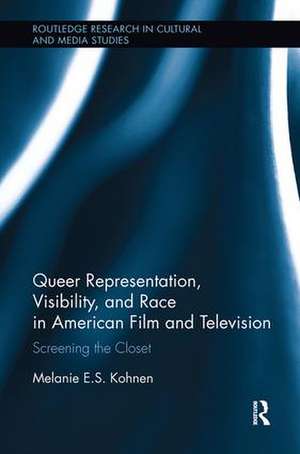Queer Representation, Visibility, and Race in American Film and Television: Screening the Closet: Routledge Research in Cultural and Media Studies
Autor Melanie Kohnenen Limba Engleză Paperback – 22 dec 2017
| Toate formatele și edițiile | Preț | Express |
|---|---|---|
| Paperback (1) | 362.42 lei 3-5 săpt. | +16.04 lei 6-12 zile |
| Taylor & Francis – 22 dec 2017 | 362.42 lei 3-5 săpt. | +16.04 lei 6-12 zile |
| Hardback (1) | 1216.52 lei 6-8 săpt. | |
| Taylor & Francis – 2 dec 2015 | 1216.52 lei 6-8 săpt. |
Din seria Routledge Research in Cultural and Media Studies
- 18%
 Preț: 701.95 lei
Preț: 701.95 lei -
 Preț: 311.81 lei
Preț: 311.81 lei -
 Preț: 311.61 lei
Preț: 311.61 lei -
 Preț: 309.50 lei
Preț: 309.50 lei -
 Preț: 364.71 lei
Preț: 364.71 lei -
 Preț: 325.59 lei
Preț: 325.59 lei -
 Preț: 310.85 lei
Preț: 310.85 lei -
 Preț: 310.99 lei
Preț: 310.99 lei -
 Preț: 272.01 lei
Preț: 272.01 lei -
 Preț: 318.07 lei
Preț: 318.07 lei - 9%
 Preț: 1005.52 lei
Preț: 1005.52 lei - 9%
 Preț: 934.94 lei
Preț: 934.94 lei -
 Preț: 389.85 lei
Preț: 389.85 lei -
 Preț: 334.02 lei
Preț: 334.02 lei - 8%
 Preț: 382.97 lei
Preț: 382.97 lei -
 Preț: 301.58 lei
Preț: 301.58 lei -
 Preț: 309.27 lei
Preț: 309.27 lei -
 Preț: 311.41 lei
Preț: 311.41 lei -
 Preț: 327.02 lei
Preț: 327.02 lei -
 Preț: 309.31 lei
Preț: 309.31 lei -
 Preț: 420.36 lei
Preț: 420.36 lei -
 Preț: 485.07 lei
Preț: 485.07 lei - 18%
 Preț: 1231.89 lei
Preț: 1231.89 lei -
 Preț: 418.56 lei
Preț: 418.56 lei - 18%
 Preț: 1222.85 lei
Preț: 1222.85 lei - 18%
 Preț: 1059.14 lei
Preț: 1059.14 lei -
 Preț: 441.96 lei
Preț: 441.96 lei - 18%
 Preț: 1061.57 lei
Preț: 1061.57 lei - 18%
 Preț: 1116.38 lei
Preț: 1116.38 lei - 18%
 Preț: 1061.22 lei
Preț: 1061.22 lei - 18%
 Preț: 1051.72 lei
Preț: 1051.72 lei - 18%
 Preț: 1056.14 lei
Preț: 1056.14 lei - 18%
 Preț: 1054.97 lei
Preț: 1054.97 lei - 18%
 Preț: 1107.94 lei
Preț: 1107.94 lei - 18%
 Preț: 1060.87 lei
Preț: 1060.87 lei - 18%
 Preț: 1066.79 lei
Preț: 1066.79 lei - 18%
 Preț: 1117.77 lei
Preț: 1117.77 lei - 18%
 Preț: 1281.24 lei
Preț: 1281.24 lei - 18%
 Preț: 1005.01 lei
Preț: 1005.01 lei - 18%
 Preț: 737.98 lei
Preț: 737.98 lei
Preț: 362.42 lei
Nou
Puncte Express: 544
Preț estimativ în valută:
69.35€ • 72.55$ • 57.61£
69.35€ • 72.55$ • 57.61£
Carte disponibilă
Livrare economică 13-27 martie
Livrare express 26 februarie-04 martie pentru 26.03 lei
Preluare comenzi: 021 569.72.76
Specificații
ISBN-13: 9780815386544
ISBN-10: 0815386540
Pagini: 196
Ilustrații: 30 Halftones, black and white; 30 Illustrations, black and white
Dimensiuni: 152 x 229 x 16 mm
Greutate: 0.28 kg
Ediția:1
Editura: Taylor & Francis
Colecția Routledge
Seria Routledge Research in Cultural and Media Studies
Locul publicării:Oxford, United Kingdom
ISBN-10: 0815386540
Pagini: 196
Ilustrații: 30 Halftones, black and white; 30 Illustrations, black and white
Dimensiuni: 152 x 229 x 16 mm
Greutate: 0.28 kg
Ediția:1
Editura: Taylor & Francis
Colecția Routledge
Seria Routledge Research in Cultural and Media Studies
Locul publicării:Oxford, United Kingdom
Public țintă
Postgraduate and UndergraduateCuprins
Introduction
1. All That Visibility Allows, or Mapping Queer Visibility
2.Visions of History: Queerness and Race in Hollywood Cinema from the Production Code to X-Men
3. Towards the 'Gay 90s:' Redefining Queer Visibility through the Lens of AIDS
4: Outside Space and Time: Screening Queerness in Brokeback Mountain and Boys Don't Cry
5: Kevin and Scotty Get Married (And Hardly Anyone is Watching): Queer Visibility, Privacy, and the Boundaries of Everyday Life on Television
Concluding Remarks
1. All That Visibility Allows, or Mapping Queer Visibility
2.Visions of History: Queerness and Race in Hollywood Cinema from the Production Code to X-Men
3. Towards the 'Gay 90s:' Redefining Queer Visibility through the Lens of AIDS
4: Outside Space and Time: Screening Queerness in Brokeback Mountain and Boys Don't Cry
5: Kevin and Scotty Get Married (And Hardly Anyone is Watching): Queer Visibility, Privacy, and the Boundaries of Everyday Life on Television
Concluding Remarks
Notă biografică
Melanie E.S. Kohnen is Visiting Assistant Professor at New York University, USA. Her research focuses on the contemporary media industry and cultural diversity. Her previous work has appeared in Journal of Popular Television, Creative Industries, and the essay collections Teen Television and Future Texts: Subversive Performance and Feminist Bodies.
Descriere
This book traces the uneven history of queer media visibility through crucial turning points including the Hollywood Production Code era, the AIDS crisis of the 1980s, the so-called explosion of gay visibility on television during the1990s, and the re-imagination of queer representations on TV after the events of 9/11. Kohnen intervenes in previous academic and popular accounts that paint the increase in queer visibility over the past four decades as a largely progressive development. She examines how and why a limited and limiting concept of queer visibility structured around white gay and lesbian characters in committed relationships has become the embodiment of progressive LGBT media representations. She also investigates queer visibility across film, TV, and print media, and highlights previously unexplored connections, such as the lingering traces of classical Hollywood cinema's queer tropes in the X-Men franchise. Across all chapters, narratives and arguments emerge that demonstrate how queer visibility shapes and reflects not only media representations, but the real and imagined geographies, histories, and people of the American nation.















